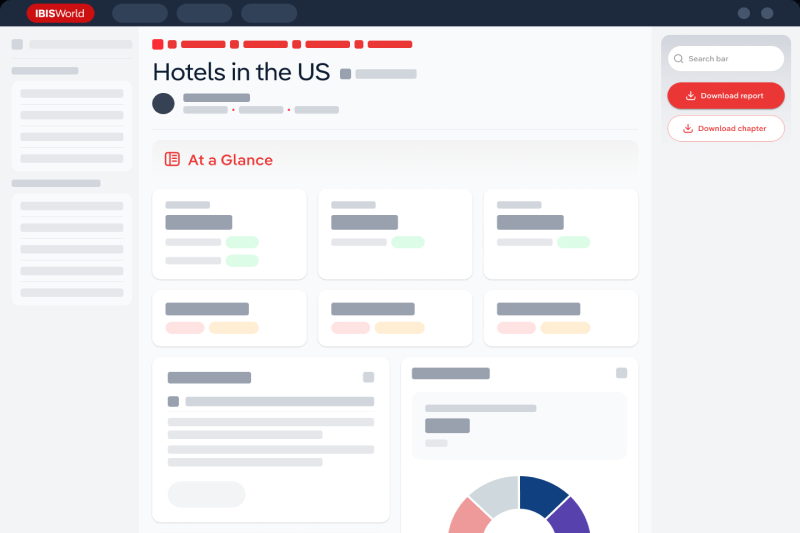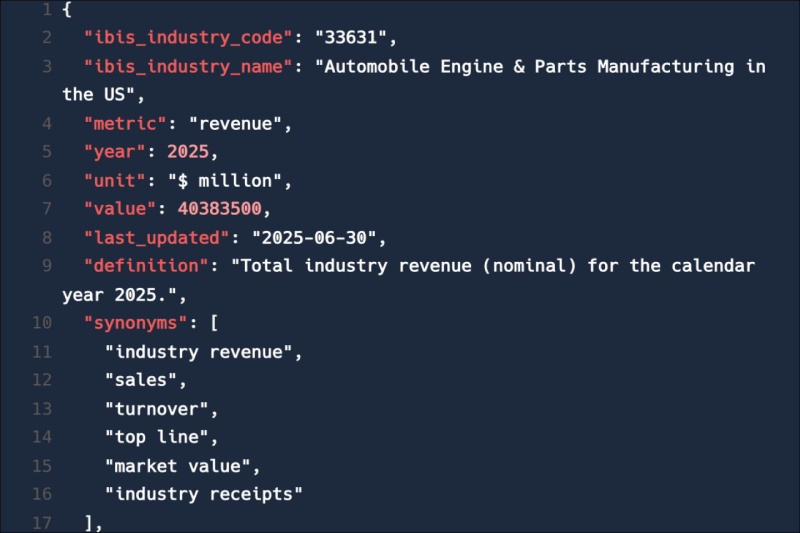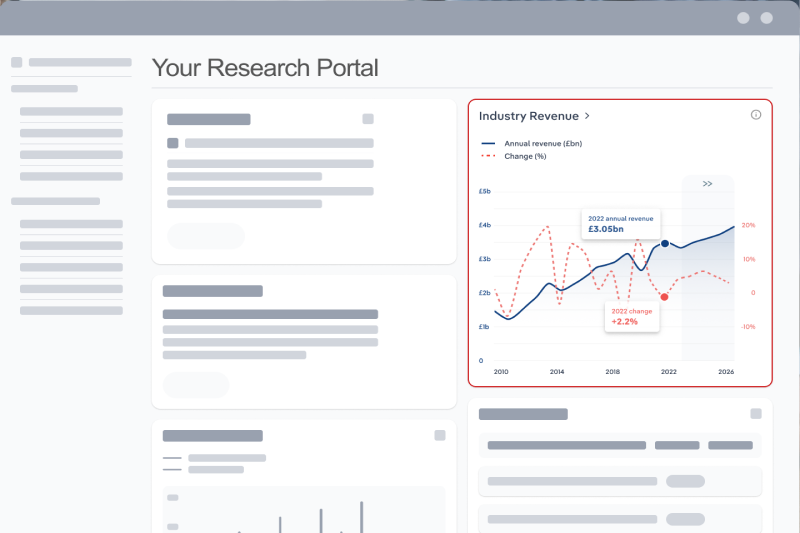IBISWorld Platform
Answer any industry question in minutes with our entire database at your fingertips.

The Promotional Products industry is experiencing solid growth as rising corporate profit fuel demand for branded merchandise. Companies are investing in more innovative and higher-quality items to stand out, strengthen brand recognition and deepen customer loyalty. From everyday logoed apparel to cutting-edge tech gadgets, these tangible products give brands practical ways to engage their audiences and boost visibility in an increasingly competitive marketplace. Industry revenue has hiked at a CAGR of 2.3% over the past five years to reach an estimated $19.8 billion in 2025, when income is projected to hike by 0.6%. This growth trajectory is further supported by an expanding number of businesses seeking to establish their brand in an ever-evolving commercial landscape.

Answer any industry question in minutes with our entire database at your fingertips.

Feed trusted, human-driven industry intelligence straight into your platform.

Streamline your workflow with IBISWorld’s intelligence built into your toolkit.
IBISWorld's research coverage on the Promotional Products industry in the United States includes market sizing, forecasting, data and analysis from 2015-2030. The most recent publication was released December 2025.
The Promotional Products industry in the United States operates under the NAICS industry code 54189. Companies in this industry design and distribute promotional products (e.g., key chains, magnets and pens). They also provide various advertising-related services, including sign lettering and window dressing. This industry doesn't include advertising agency services, public relations agency services, media-buying agency services, media representative services, display advertising services, direct-mail advertising services or marketing consulting services. Related terms covered in the Promotional Products industry in the United States include blank, advertising specialty, traditional media, below-the-line promotion and economies of scale.
Products and services covered in Promotional Products industry in the United States include Customization and distribution of promotional products, Custom sign fabrication and Product or merchandise demonstrations.
Companies covered in the Promotional Products industry in the United States include Premium Retail Services Inc., Halo Branded Solutions Inc. and 4imprint Group Plc.
The Performance chapter covers detailed analysis, datasets, detailed current performance, sources of volatility and an outlook with forecasts for the Promotional Products industry in the United States.
Questions answered in this chapter include what's driving current industry performance, what influences industry volatility, how do successful businesses overcome volatility, what's driving the industry outlook. This analysis is supported with data and statistics on industry revenues, costs, profits, businesses and employees.
The Products and Markets chapter covers detailed products and service segmentation and analysis of major markets for the for the Promotional Products industry in the United States.
Questions answered in this chapter include how are the industry's products and services performing, what are innovations in industry products and services, what products or services do successful businesses offer and what's influencing demand from the industry's markets. This includes data and statistics on industry revenues by product and service segmentation and major markets.
The Geographic Breakdown chapter covers detailed analysis and datasets on regional performance of the Promotional Products industry in the United States.
Questions answered in this chapter include where are industry businesses located and how do businesses use location to their advantage. This includes data and statistics on industry revenues by location.
The Competitive Forces chapter covers the concentration, barriers to entry and supplier and buyer profiles in the Promotional Products industry in the United States. This includes data and statistics on industry market share concentration, barriers to entry, substitute products and buyer & supplier power.
Questions answered in this chapter include what impacts the industry's market share concentration, how do successful businesses handle concentration, what challenges do potential industry entrants face, how can potential entrants overcome barriers to entry, what are substitutes for industry services, how do successful businesses compete with substitutes and what power do buyers and suppliers have over the industry and how do successful businesses manage buyer & supplier power.
The Companies chapter covers Key Takeaways, Market Share and Companies in the Promotional Products industry in the United States. This includes data and analysis on companies operating in the industry that hold a market share greater than 5%.
Questions answered in this chapter include what companies have a meaningful market share and how each company is performing.
The External Environment chapter covers Key Takeaways, External Drivers, Regulation & Policy and Assistance in the Promotional Products industry in the United States. This includes data and statistics on factors impacting industry revenue such as economic indicators, regulation, policy and assistance programs.
Questions answered in this chapter include what demographic and macroeconomic factors impact the industry, what regulations impact the industry, what assistance is available to this industry.
The Financial Benchmarks chapter covers Key Takeaways, Cost Structure, Financial Ratios, Valuation Multiples and Key Ratios in the Promotional Products industry in the United States. This includes financial data and statistics on industry performance including key cost inputs, profitability, key financial ratios and enterprise value multiples.
Questions answered in this chapter include what trends impact industry costs and how financial ratios have changed overtime.
The Industry Data chapter includes 10 years of historical data with 5 years of forecast data covering statistics like revenue, industry value add, establishments, enterprises, employment and wages in the Promotional Products industry in the United States.
More than 6,000 businesses use IBISWorld to shape local and global economies
We were able to supplement our reports with IBISWorld’s information from both a qualitative and quantitative standpoint. All of our reporting now features some level of IBISWorld integration.

IBISWorld delivers the crisp business knowledge we need to drive our business. Whether it be serving up our major clients, winning new business or educating on industry issues, IBISWorld brings real value.

IBISWorld has revolutionised business information — which has proved commercially invaluable to exporters, investors and public policy professionals in Australia and overseas.

When you’re able to speak to clients and be knowledgeable about what they do and the state that they operate in, they’re going to trust you a lot more.

The market size of the Promotional Products industry in the United States is $19.8bn in 2026.
There are 6,501 businesses in the Promotional Products industry in the United States, which has grown at a CAGR of 0.9 % between 2020 and 2025.
The Promotional Products industry in the United States is unlikely to be materially impacted by import tariffs with imports accounting for a low share of industry revenue.
The Promotional Products industry in the United States is unlikely to be materially impacted by export tariffs with exports accounting for a low share of industry revenue.
The market size of the Promotional Products industry in the United States has been growing at a CAGR of 2.3 % between 2020 and 2025.
Over the next five years, the Promotional Products industry in the United States is expected to grow.
The biggest companies operating in the Promotional Products industry in the United States are Premium Retail Services Inc., Halo Branded Solutions Inc. and 4imprint Group Plc
Customization and distribution of promotional products and Custom sign fabrication are part of the Promotional Products industry in the United States.
The company holding the most market share in the Promotional Products industry in the United States is Premium Retail Services Inc..
The level of competition is high and steady in the Promotional Products industry in the United States.




